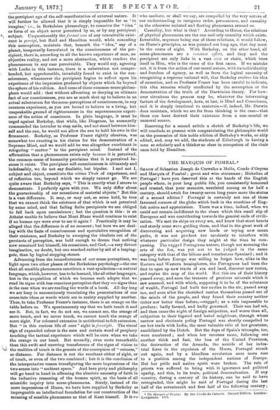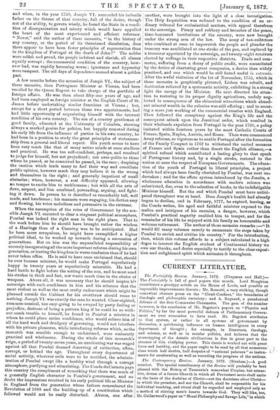THE MARQUIS OF POMBAL.*
SHADE of Sebastian Joseph de Carvalho e Mello, Conde d'Oeyras and Marquis of Pombal ; great and wise statesman ; Richelieu of Portugal have you deserved this at the hands of the English people whom, in your long public life, you consistently honoured and trusted, that your memoirs, unrelated among us for half a century, should await for twenty-seven long years more the status of a second edition ? Portugal is certainly not one of those favoured corners of the globe which bask in the sunshine of Eng- lish notice and appreciation. There was a time, indeed, when we could not remain indifferent to the share which this small slip of European soil was contributing towards the general ends of civili- zation. We met its ships on every sea, and knew that stout hearts and sturdy arms were guiding them, and that in the great work of discovering and acquiring new lands or trying new ocean paths, it was not prudent too carelessly to interfere with whatever particular design they might at the time be com- passing. The rugged Portuguese nature, though not scorning the arts of the fox, was yet not to be judged in the same category with that of the bilious and treacherous Spaniard ; and it was long before Europe was willing to forget how, alike in the Eastern and Western hemispheres, the Portuguese had been the first to open up new tracts of sea and land, discover new routes, and replan the map of the world. But this era of their history passed away, and soon the treasure of precious minerals which it saw amassed, and with which, supposing it to be of the substance of wealth, Portugal had built her castles in the air, passed away too, and soon after the cherished castles themselves passed out of the minds of the people, and they found their country neither richer nor better than before,—rugged ; as a rule impassable to produce ; badly farmed, and badly governed. Their sun had set, and then came the night of foreign subjection, and worse than all, subjection to their bigoted and hated neighbour, through whose narrow and obstinate policy Portugal was shortly compelled to see her trade with India, the most valuable relic of her greatness, annihilated by the Dutch. But the days of Spain's triumphs, too, were numbered ; and when her reverses came, following one another thick and fast, the loss of the United Provinces, the destruction of the Armada, the suicide of her indus- trial force in the expulsion of the Moors, Portugal struck out again, and by a bloodless revolution once more rose to a position among the independent nations of Europe. But her pride and native spirit were broken. The rule of priests was suffered to bring with it ignorance and political apathy, and this, in its train, political demoralization. If any country, during a century of its history, can be said to have retrograded, this might be said of Portugal during the last half of the seventeenth and first half of the following century ; The Marquis of Pombal. By the Conde da Carnots. Second Edition. London : Longman. 1871.
and when, in the year 1750, Joseph VI. succeeded his imbecile father on the throne of that country, full of the desire, though not of the ability, to govern wisely, he found the State in a'condi- tion of disorganization and misery which would have appalled the heart of the most experienced and efficient reformer. " Never," said the author of these memoirs, " in the history of any country, at the period of its threatened dissolution, does there appear to have been fewer principles of regeneration than in the kingdom of Portugal at the death of John ?" The nobles were selfish and proud, the people indolent and slavish, all classes equally corrupt ; the commercial condition of the country, how- ever bad, was rapidly becoming worse ; ignorance and hypocrisy were rampant. The old days of dependence seemed almost a golden past.
A few months before the accession of Joseph VI., the subject of these memoirs, then Portuguese Minister at Vienna, had been recalled by the Queen Regent to take charge of the portfolio of foreign affairs. He was then about fifty-one years of age, and had been employed as foreign minister at the English Court of St. James before undertaking similar functions at Vienna ; but, except for a short period between these two appointments, had had little opportunity of acquainting himself with the internal condition of his own country. The son of a country gentleman of good family, educated at the University of Coimbra, showing always a marked genius for politics, but happily removed during his early life from the influence of parties in his own country, he had been in a position to study the great principles of statesman- ship from a general and liberal aspect. His youth seems to have been very much like that of many active minds at once studious and practical. He was too self-confident, perhaps, and resolved to judge for himself, but not prejudiced ; not over-polite to those whom he passed, or he conceived he passed, in the race ; despising the caution which leads many to feel their way and conciliate public opinion, however much they may believe it in the wrong and themselves in the right ; and generally impatient of small obstacles ; when, however, a real difficulty appeared, allowing no temper to excite him to recklessness ; but with all the arts of dove, serpent, and lion combined, persuading, arguing, and fight- ing it down. In person he is described as remarkably tall, well made, and handsome ; his manners were engaging, his diction easy and flowing, his voice melodious and persuasive in the extreme.
When the assumption of the reins of Government by the sen- sible Joseph VI. occurred to clear a stagnant political atmosphere, Pombal was indeed the right man in the right place. That to the work before him he should have brought rather the wisdom of a Hastings than of a Canning was to be anticipated. Had he been more scrupulous, he might have exemplified a higher political ideal, to be worked up towards during a succession of generations. But on him was the unparalleled responsibility of securely inaugurating all the more important reforms during his own generation, or leaving the kingdom in worse confusion than if he had never taken office. He is said to have once exclaimed that, should he ever become minister, he would make Portugal superlatively happy in twenty years or superlatively miserable. He had a hard battle to fight before the setting of the sun, and he must send his strokes in thick and fast, nor waste much time in the choice of weapons. Above all, it was necessary that he should inspire his sovereign with such confidence in him and his schemes that the most violent as well as the most crafty endeavours which might be planned outside the Cabinet for his overthrow should come to nothing. Joseph VI. was exactly the man he wanted. Clear-sighted, common-sensical, too easy-going to be swayed by party feeling or prejudice, desirous of being a pattern king if he could be so with- out much trouble to himself, he found in Pombal a minister in whom he could place entire confidence, who would relieve him of all the hard work and drudgery of governing, would not interfere with his private pleasures, while introducing reforms which, as the monarch was sensible enough to understand, were eminently practical and wholesome. During the whole of this monarch's reign, a period of twenty-seven years, an unrelenting war was waged against all that Pombal deemed deserving of extinction, effete, corrupt, or behind the age. Throughout every department of social activity, wherever evils were to be rectified, the adminis- tration of Pombal swept like a healthy wind through a corrupt atmosphere, purifying and stimulating. The Conde da Carnota pays this country the compliment of remarking that there was much of a generally English character in Pombal's government, and no doubt the impressions received in his early political life as Minister in England from the generation whose fathers remembered the Revolution of 1688 and the building-up of a constitution which followed would not be easily disturbed. Abuses, one after
another, were brought into the light of a close investigation. The Holy Inquisition was reduced to the condition of an or- dinary tribunal for ecclesiastical matters, with appeal therefrom to the sovereign. Piracy and robbery and breaches of the peace, time-honoured institutions of the country, were now brought under the strong arm of the law. The army of tax-collSetora who combined at once to impoverish the people and plunder the treasury was annihilated at one stroke of the pen, and replaced by a treasurer appointed by the sovereign, and twenty-eight receivers elected by suffrage in their respective districts. Trade and com- merce, suffering from a decay of public credit, were resuscitated by the device of chartering great companies, a device then widely practised, and one which would be still found useful in extremis. After the awful visitation of the 1st of November, 1755, which in these memoirs is graphically pictured, Lisbon was rebuilt, and destitution relieved by a systematic activity, exhibiting in a strong light the energy of the Minister. He next directed his atten- tion to restoring to its proper dignity agriculture, unduly neg- lected in consequence of the chimerical attractions which abund- ant mineral wealth in the colonies was still offering ; and to secur- ing a more just working of the commercial treaties with England. Then followed the conspiracy against the King's life and the consequent attack upon the Jesuitical order, which resulted in their wholesale expulsion from Portugal in the year 1760, a policy imitated within fourteen years by the most Catholic Couits of France, Spain, Naples, Austria, and Rome. Then were commenced Army reforms, so vigorous as to enable Portugal after the formation of the Family Compact in 1762 to withstand the united menaces of France and Spain rather than desert the English alliance,—a spirited refusal which contributed a lasting glory to that epoch of Portuguese history and, by a single stroke, restored to the nation at once the respect of European Governments. The educa- tion of the youth of Portugal in liberal principles, a project which had always been fondly cherished by Pombal, was next un- dertaken ; and for the effete system introduced by the Jesuits, a wholesome education in accordance with modern science was substituted, due, even to the selection of books, to the indefatigable Minister himself. But the end which Pombal must have antici- pated throughout was at hand. Dom Joseph's health had already begun to decline, and in February, 1777, he expired, leaving, as the Conde writes, his aged and faithful minister exposed to the malice and intrigues of his enemies, a danger, however, which Pombal's practical sagacity enabled him to temper, and for the remainder of his life he enjoyed with his family an honourable and welcome retirement. The author of these memoirs remarks :—" It would fill many volumes merely to enumerate the steps taken by Pombal to enrich and civilize his country." For the introduction, then, which this volume affords to a subject calculated in a high degee to interest the English student of Continental history we owe our thanks, and desire especially to testify to the clear exposi- tion and enlightened spirit which animates it throughout.











































 Previous page
Previous page